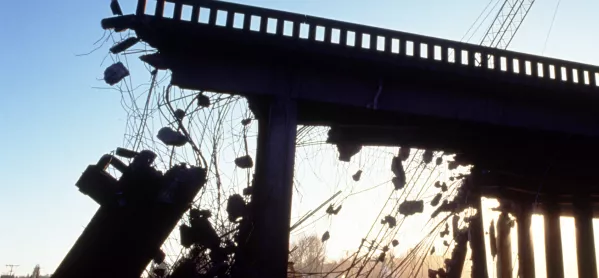The prospect of school buildings collapsing has been flagged as a “worsening” risk by the Department for Education in its annual report.
The “school buildings” risk rating has been upgraded from “critical” to “very likely”, and the issue has been escalated to a group of top officials from across government, the report states.
According to the DfE’s Consolidated Annual Report and Accounts 2021-22, “increased numbers of serious structural issues” were identified last October.
And the risk was deemed “unlikely to reduce in 2022 as there was no agreement to increase condition funding or the scale of the rebuilding programme” at the 2021 Spending Review.
In a section of the report on “key risks”, school buildings are listed as a “principal” risk, with the situation described as “worsening”.
Other key risks listed by the DfE include “education recovery”, “vulnerable children attendance and attainment” and ’“high-needs cost pressure”.
The risk of school buildings falling down
The report describes the buildings risk as: “The collapse of one or more blocks in some schools which are at or approaching the end of their designed life expectancy and where structural integrity is impaired.
“The risk predominantly exists in those buildings built in the years 1945 to 1970 which used ‘system build’ light-frame techniques.”
However, at the time of publication, there were no open schools or college buildings “where we know of an imminent risk to life”, the report adds.
In Parliament in October, Kit Malthouse, when he was education secretary, described how a survey on school buildings had revealed “alarming” problems that the government was trying to rectify.
More schools were allocated for rebuilds last week as part of the government’s flagship school rebuilding programme, but Geoff Barton, general secretary of the Association of School and College Leaders, described this as coming “against a background of long-term government neglect which has led to the deterioration of many school buildings”.
Earlier this month the DfE announced that schools in England will get a share of a £500 million pot to spend on energy upgrades to make their buildings more efficient, but they can spend it on other capital projects, too.
In response to the annual report, Bridget Phillipson, Labour’s shadow education secretary, said: “Eighteen months from the Department for Education knowing that school buildings were ‘very likely’ to collapse and six months since these buildings were revealed to pose ‘a risk to life’, ministers will still not tell parents where dangerous school buildings are.
“This Conservative government is risking its most basic duty: to keep our children safe from harm.
“The secretary of state needs to come to the House as soon as possible and tell parents where these buildings are and that they are urgently being made safe.”
Education recovery risk stays the same
The risk involving education recovery, which is described as “stable”, has stayed stable throughout the period that the report relates to, which is from April 2021 to April 2022.
The DfE describes the risk as being that “children and young people do not recover from the impact of the pandemic, leading to widened attainment gaps between pupils (linked to socioeconomic disadvantage, SEND [special educational needs and disabilities] and place)”.




